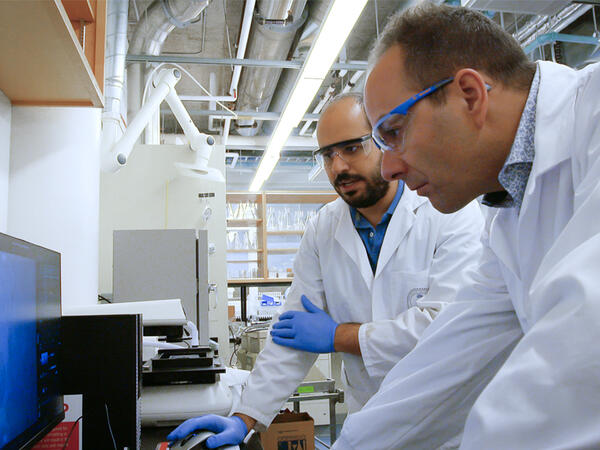
Stéphane
Angers
Donnelly Centre, 160 College St
Rm 808
Toronto ON M5S 3E1
Canada
Area of Research
Stéphane Angers’ research focuses on the molecular mechanisms underlying signal transduction events activated by the Wnt and Hedgehog families of secreted growth factors. Angers is developing novel therapeutics that target these pathways for the treatment of cancer.
Research Challenge
The same processes that control the self-renewal and proliferation of stem cells are likely involved in the initiation and/or progression of many cancers. The Wnt and Hedgehog families of growth factors play fundamental roles during embryonic development and adult tissue homeostasis. Binding of these proteins to their receptors at the cell surface affects the proliferation, differentiation and migration of the target stem cell. When proteins involved in the pathways controlled by Wnt or Hedgehog are mutated, the result can be aberrant signaling leading to uncontrolled proliferation and tumorigenesis.
Proposed Solution
The aim of Angers’ research program is to decipher the Wnt and Hedgehog signal transduction pathways in normal cells and examine how dysregulation of these pathways can result in human diseases such as cancer. Across their research, the Angers Lab uses a combination of patient-derived stem cells, organoids (self-organizing tissue), and animal models of disease. Using novel proteomic and genomic tools, they investigate how the Wnt and Hedgehog pathways function in both normal and human disease contexts. The group also uses genome-wide CRISPR-Cas9 functional screens performed in patient-derived cancer stem cells to characterize the genes that are essential for tumor growth. By leveraging this knowledge, the Angers Lab is identifying novel therapies based on modulating the activity of the Wnt and Hedgehog pathways.
Impact To Date
The Angers Lab has successfully optimized mass-spectrometry and functional genomic approaches for identifying new components implicated in Wnt and Hedgehog signalling pathways. This has allowed them to make discoveries of key genes driving proliferation in certain cancers, such as the Frizzled-5 receptor which is important in subsets of pancreatic cancer. The Angers lab is developing synthetic antibodies blocking Wnt receptors to inhibit the overactivity of the Wnt pathway in cancer cells. If these studies are successful, they may eventually be translated into new cancer therapies. On the flip side, these pathways can also be carefully modulated to promote the activity of tissue stem cells enhancing tissue repair for regenerative medicine.
Publications
Keywords: CRISPR, Cas9, Signal Transduction, Wnt, Hedgehog families, growth factors, Cullin families, E3 ubiquitin ligases, ligases, human cancers, cancer, mass spectrometry, proteomic, E3 ligases


